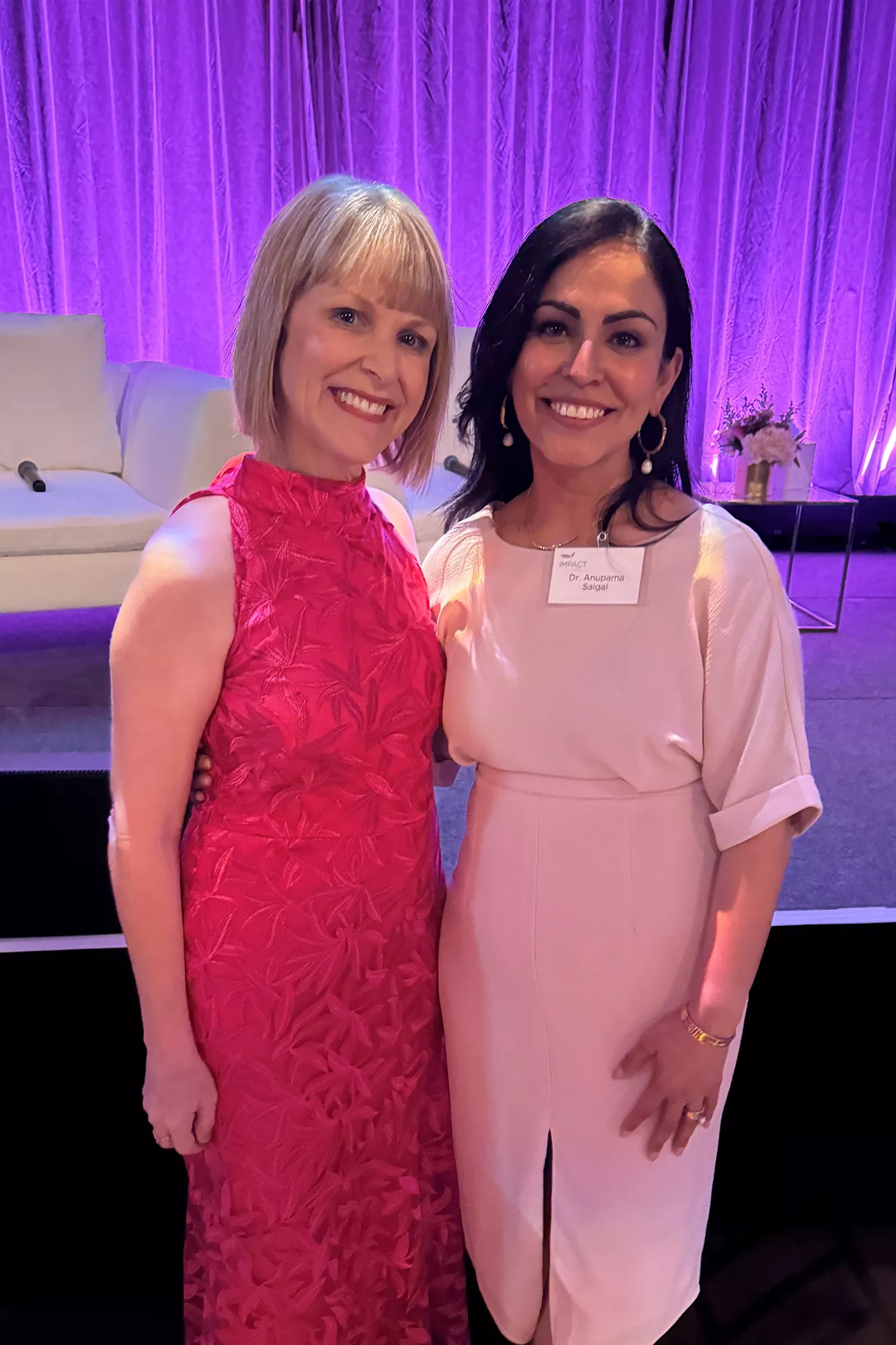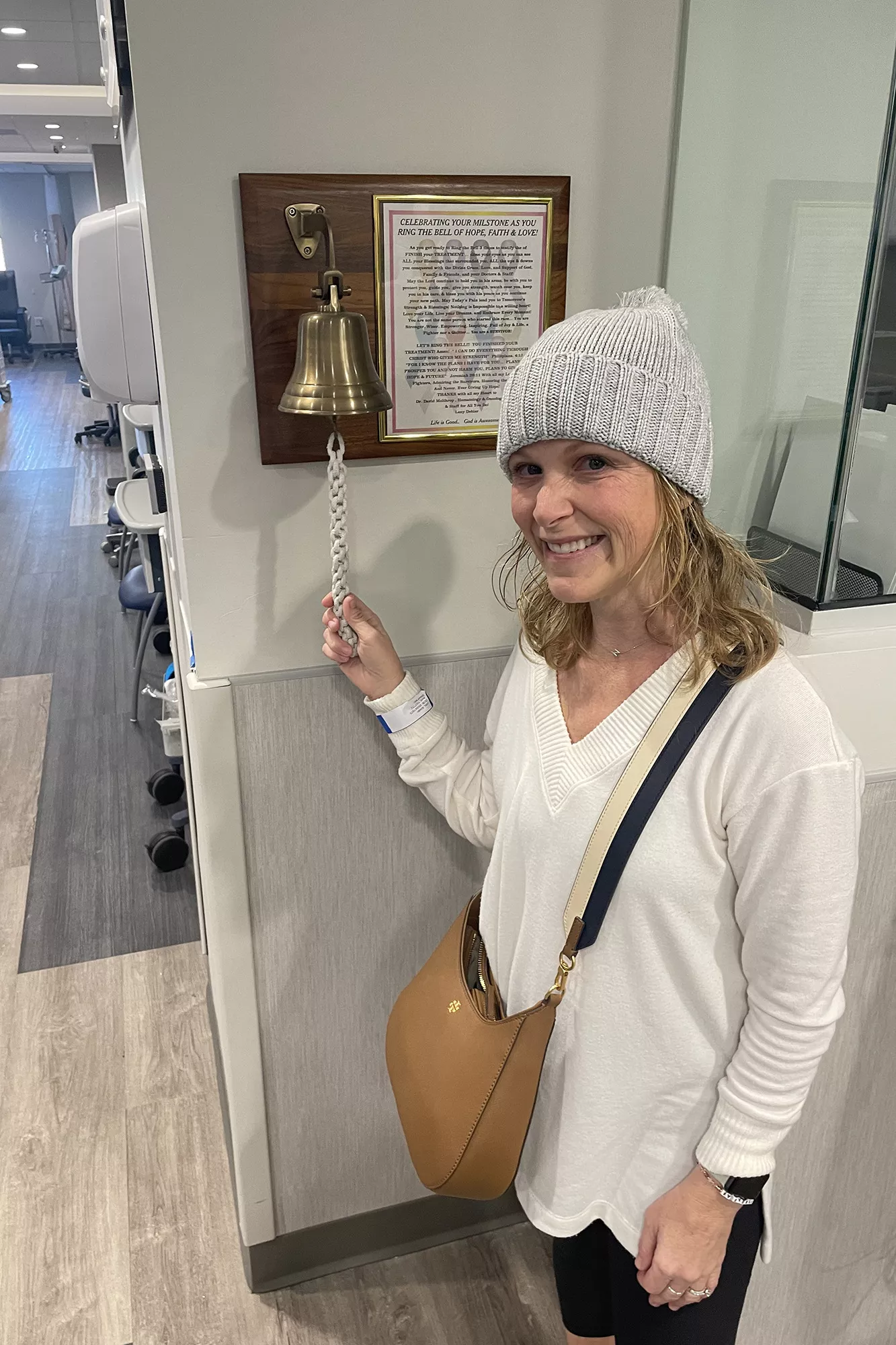- Kristi Powers
AdventHealth News Briefing: October Breast Cancer Awareness Month 2024
“The only way through it is through it.” Breast cancer survivor Kristin Harmel had the first letters of each word in this phrase engraved on a ring in December 2022 as a reminder during her upcoming three-month chemotherapy treatment of how she planned to fight through the most difficult chapter of her life.

“When I heard the words, ‘you have cancer,’ I immediately thought of my six-year-old son and how this would impact his life,” said Harmel. “I knew I needed to do all I could to make sure my cancer never returned. ‘The Only Way Through It Is Through It’ became my mantra.”
This New York Times best-selling author found herself writing an unexpected, rather scary chapter in her personal story. It started two months earlier when she went into AdventHealth Imaging Center in Winter Garden for her standard mammogram.
“The only reason my cancer was caught is because I went in for my regular mammogram,” said Harmel. “I didn’t feel a lump.”
The week after, Harmel, 43 at the time, with no relevant family history and no genetic markers, found herself sitting in disbelief in the office of Anupama Saigal, MD, a breast surgical oncologist with the AdventHealth Cancer Institute in Winter Park preparing for a biopsy.
“Dr. Saigal and her team went above and beyond from the beginning,” said Harmel. “A team member named Karen actually skipped her lunch to fit my biopsy in that day, which was tremendously kind. I remember Dr. Saigal saying, ‘I’ve got you; you’re going to be OK,’ which was comforting.”
“Kristin had fibrocystic changes and after a biopsy, we were all shocked she had cancer,” said Dr. Saigal. “She had a small surgery, preserving her breast, but due to the aggressive nature of the cancer cells, she underwent both chemotherapy and radiation.”
Over the months ahead, Harmel would find herself in the fight of her life, much like the female characters she writes about in her historical fiction novels.
“I write stories about strong women who face difficult times and, in the darkest hours, find light and strength within themselves, usually set during World War II,” said Harmel.
When she was diagnosed, her publishing team rallied around her and pushed the deadline for her upcoming book, The Stolen Life of Colette Marceau, back a year.
“I tried to write during my cancer treatments, but that side of my brain just wasn’t firing. It was a real loss of identity, and I feared it might be permanent,” said Harmel. “Others told me it was just chemo brain and luckily, they were right.”
From December 2022 through March 2023, Harmel underwent chemotherapy, doing an infusion every three weeks, and in April 2023 she started radiation treatment at AdventHealth Winter Park.
“In Kristin’s case, getting ultrasound imaging in addition to her mammogram was key to catching it early and saving her life,” said Dr. Saigal. “Because of her dense breast tissue, had she not gotten both types of imaging, her cancer could’ve been missed and turned into stage three very quickly.”

Dr. Saigal encourages all women to be an advocate for themselves in three ways:
- Be proactive and get screened early and regularly.
- Ask about family history and how it plays into risk.
- Ask about having dense breast tissue and how that affects imaging and treatment.
The American Cancer Society recommends screening start at the age of 40 for women with no personal or family history and no genetic markers. However, mammograms should start earlier if a close relative has been diagnosed.
“If your mother got breast cancer at 46, then you should start at 36,” said Dr. Saigal. “In addition, you would be considered high risk, and I would recommend having an ultrasound, and in some cases an MRI, added to your regular mammogram, but separated six months apart.”
Dr. Saigal also urges lifestyle modifications to help prevent breast cancer.
“We can change our diet, our activity levels and control what we put into our bodies, medications included,” said Dr. Saigal. “These things along with the manipulation of the female reproductive system for an extended long period of time, are pushing those cells to sort of go a little haywire.”
For Harmel, she feels like herself again and now has a new lease on life - and a new perspective.
“The first thing we think of when we hear the word cancer, I think, is our own mortality. But a diagnosis doesn’t mean you’re going to die; it means you’re going to go through a difficult journey. It also means you’ll discover strength you didn’t know you had along the way. If you take one thing away from my story, I hope it’s that if you’re overdue for mammogram, you should call your doctor to schedule one today,” said Harmel.
When her personal breast cancer chapter closes through living life, processing and healing, look for Harmel to continue speaking publicly about her breast cancer experience to remind her readers worldwide how important it is to stay vigilant about their own health.
Recent News
AdventHealth has named Andrew Santos president/CEO of AdventHealth North Pinellas, effective Jan. 12.
Nearly a dozen AdventHealth hospitals have been recognized as Leapfrog Top Hospitals for 2024, a distinction awarded to fewer than six percent of eligible hospitals in the United States.
David Weis has been promoted to serve as president/CEO for the region covering east Volusia, Flagler and St. Johns counties. Lorenzo Brown has been promoted to serve as president/CEO for the region...
On the newest Inspiring Wholeness podcast, Obie Diaz, local morning radio show host, shares how a routine physical eventually led to two open heart surgeries.
AdventHealth President and CEO Terry Shaw has been named one of Modern Healthcare’s 100 Most Influential People in Healthcare for 2024, marking continued recognition of Shaw as a transformative leader...
AdventHealth President/CEO Terry Shaw's retirement is planned for July 2025.
On the newest Inspiring Wholeness podcast, Obie Diaz, local morning radio show host, shares how a routine physical eventually led to two open heart surgeries.
AdventHealth has named Elise MacCarroll-Wright as president and CEO of UChicago Medicine AdventHealth Hinsdale in its Great Lakes Region, effective Jan. 6, 2025.
AdventHealth has named Dave Tkachuck president/CEO for UChicago Medicine AdventHealth La Grange, effective Jan. 6.
A UChicago Medicine AdventHealth neurologist addresses the growing gap between the number of men and women diagnosed with MS.
AdventHealth has named Ryan Quattlebaum president/CEO for AdventHealth Wesley Chapel, effective Dec. 29.










